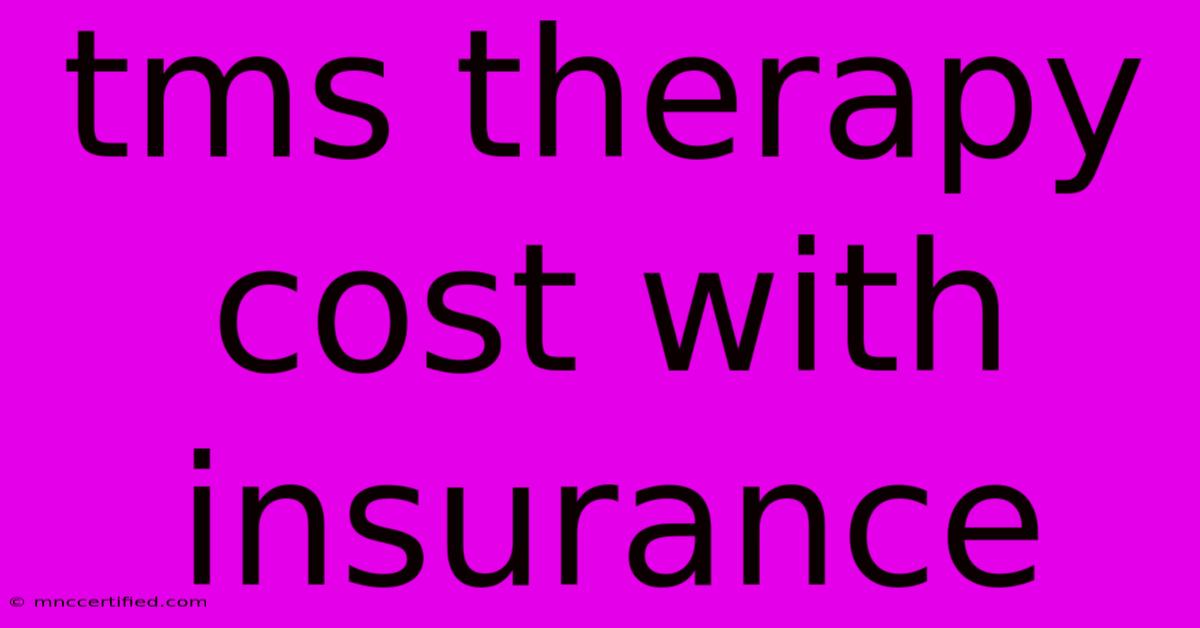Tms Therapy Cost With Insurance

Table of Contents
TMS Therapy Cost with Insurance: A Comprehensive Guide
Transcranial magnetic stimulation (TMS) therapy is a non-invasive treatment for depression and other mental health conditions. While it can be highly effective, the cost of TMS therapy is a significant consideration for many patients. Understanding how insurance coverage impacts the overall expense is crucial before beginning treatment. This comprehensive guide will delve into the intricacies of TMS therapy costs and insurance coverage, empowering you to make informed decisions about your care.
Understanding the Cost of TMS Therapy Without Insurance
The out-of-pocket cost of TMS therapy can vary significantly depending on several factors:
- Number of sessions: A typical course of TMS therapy involves several weeks of daily treatments. The more sessions needed, the higher the total cost.
- Location: Costs can vary geographically. Treatment centers in major metropolitan areas may charge more than those in smaller towns.
- Type of TMS: Different types of TMS (e.g., rTMS, deep TMS) may have varying price points. Deep TMS, for example, often involves a higher cost due to the specialized equipment involved.
Without insurance, a single TMS session can cost anywhere from $200 to $1000, depending on the factors mentioned above. A full course of treatment can easily reach $4,000 to $15,000 or more. This substantial cost can be a major barrier to accessing this potentially life-changing treatment.
Navigating Insurance Coverage for TMS Therapy
Many insurance providers now offer some level of coverage for TMS therapy, although the specifics vary widely. Factors influencing your coverage include:
- Insurance provider: Different insurance companies have different policies and coverage levels for TMS. Some may cover a portion of the cost, while others may deny coverage altogether. Always check your policy's specific details.
- Pre-authorization requirements: Most insurers require pre-authorization before starting TMS treatment. This involves submitting medical documentation demonstrating the medical necessity of the treatment. Failure to obtain pre-authorization may lead to higher out-of-pocket costs or denied claims.
- Diagnostic code: Accurate diagnostic coding is vital for successful insurance claims. Ensure your physician uses the appropriate ICD-10 codes for your condition to increase the likelihood of coverage.
- Mental health parity laws: In many jurisdictions, mental health parity laws mandate that insurance plans cover mental health services, including TMS, at the same level as other medical services. However, interpretation and application of these laws can vary.
Strategies to Maximize Insurance Coverage
- Contact your insurance provider: Before initiating treatment, contact your insurer directly to inquire about your coverage for TMS therapy. Ask about pre-authorization requirements, covered services, and any limitations.
- Choose an in-network provider: Opting for a TMS therapy provider within your insurance network can significantly reduce your out-of-pocket expenses.
- Appeal denials: If your insurance claim is denied, don't hesitate to appeal the decision. Provide your insurer with additional medical documentation supporting the medical necessity of the treatment.
- Explore financial assistance programs: Some TMS providers offer financial assistance programs or payment plans to help manage the cost of treatment. Inquire directly with your chosen provider.
Finding Affordable TMS Therapy
Accessing affordable TMS therapy requires proactive steps:
- Research providers: Compare prices and insurance coverage offered by different TMS therapy centers in your area.
- Negotiate payment plans: Many clinics offer payment plans to make TMS therapy more manageable financially.
- Seek out financial assistance: Explore potential resources like patient assistance programs or foundations that support mental health treatments.
Conclusion: Making TMS Therapy Accessible
While the cost of TMS therapy can be substantial, understanding insurance coverage and exploring various financial strategies can significantly improve accessibility. Proactive communication with your insurance provider and TMS provider is key to navigating the financial landscape of this potentially life-changing treatment. Remember to thoroughly research your options and don't hesitate to advocate for your healthcare needs. The benefits of TMS therapy can be profound, and with careful planning, it can become a realistic treatment option for many individuals.

Thank you for visiting our website wich cover about Tms Therapy Cost With Insurance. We hope the information provided has been useful to you. Feel free to contact us if you have any questions or need further assistance. See you next time and dont miss to bookmark.
Featured Posts
-
Bearce Insurance Bridgewater Ma
Nov 25, 2024
-
Ashley Tuttle Shelter Insurance
Nov 25, 2024
-
Actual Loss Sustained Insurance
Nov 25, 2024
-
Aparcamiento Insur Buenos Aires
Nov 25, 2024
-
State Farm Insurance Downgraded
Nov 25, 2024